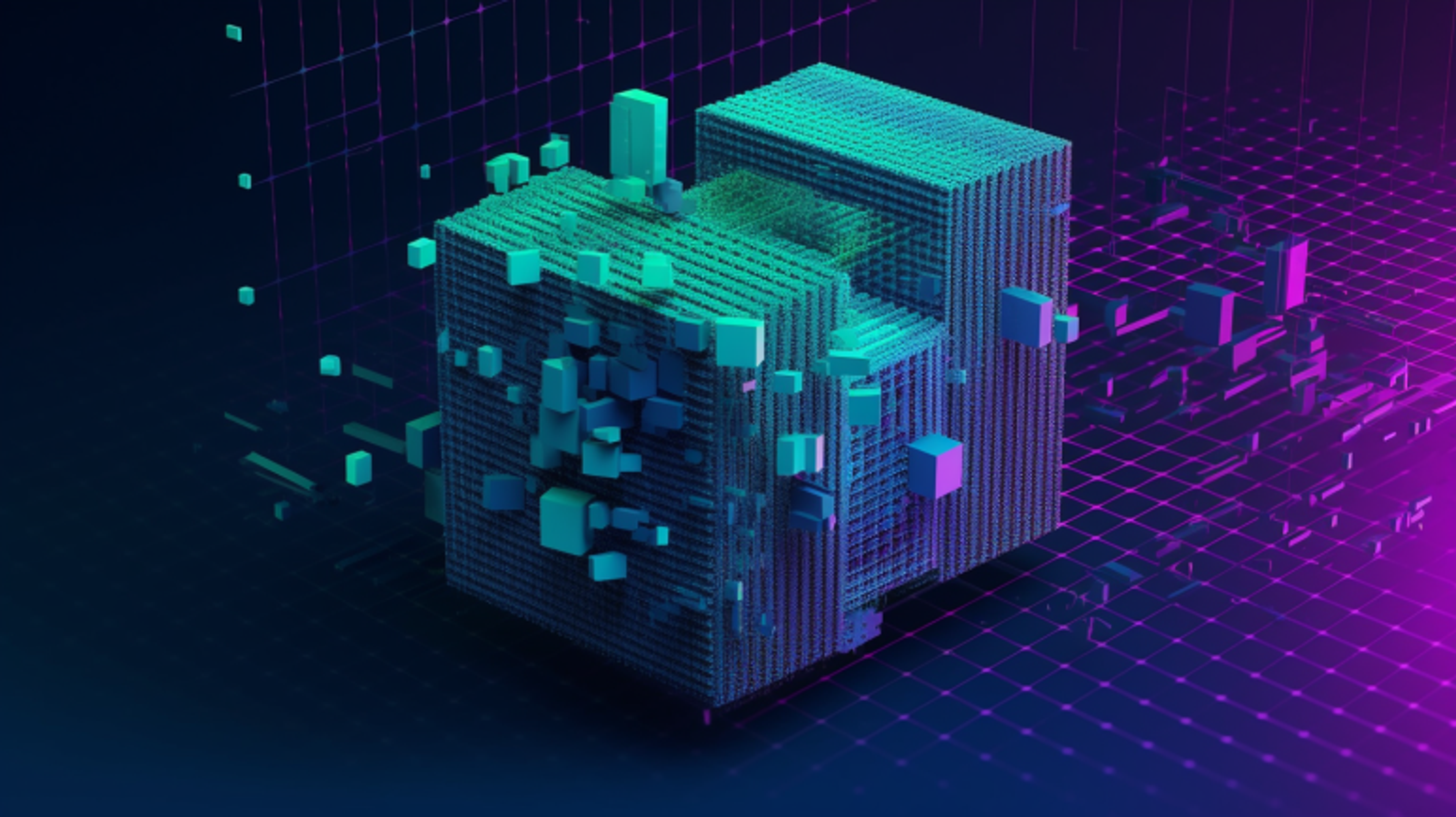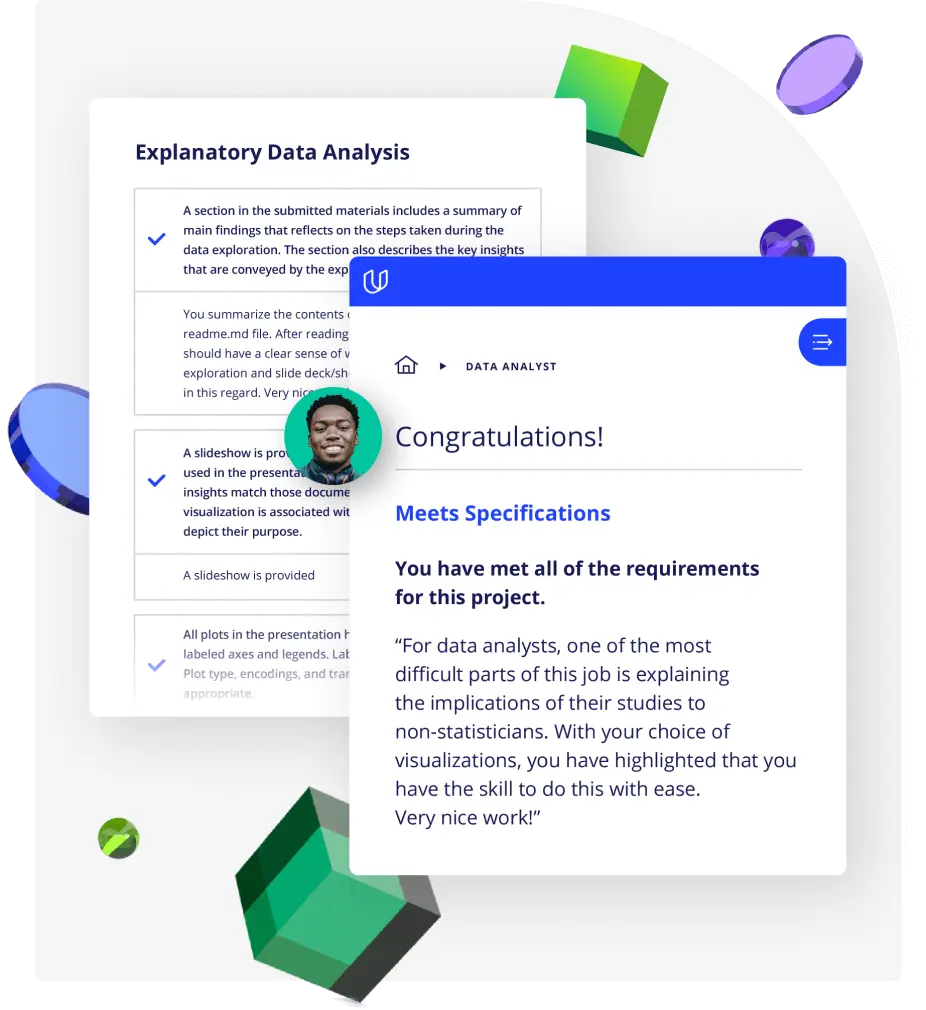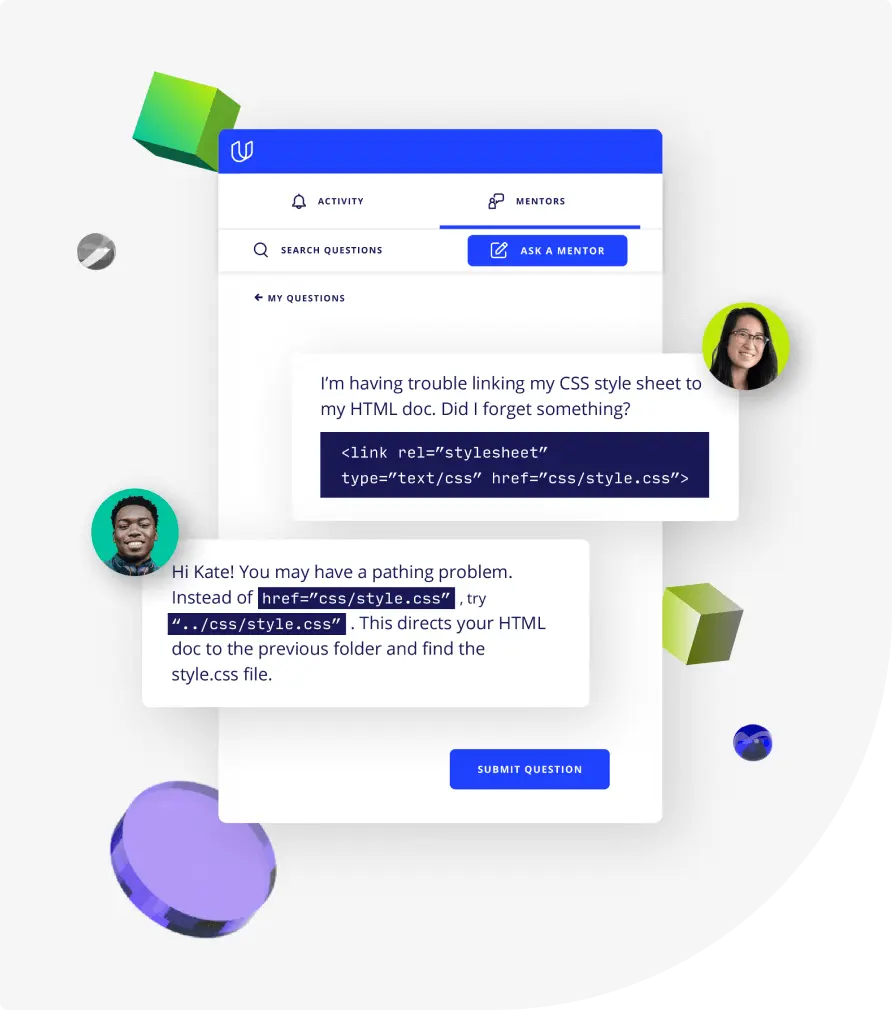Lesson 1
Welcome to the Nanodegree
Welcome to the Programming for Data Science Nanodegree program! In this lesson, you will learn more about the structure of the program and meet the team.

Nanodegree Program
This Programming for Data Science with R Nanodegree program provides an overview of data analysis and programming. In the SQL course, students learn to use SQL to answer complex business problems, including basic commands, joins, and aggregations. In the R course, students learn programming fundamentals and topics such as data types, functions, loops, and conditional statements. They learn to read and manipulate data in R, create basic visualizations, and perform statistical analysis. The version control course teaches students to use Git and GitHub to manage versions of programs and collaborate with others. These courses include practical projects where students use their skills to analyze real data.
This Programming for Data Science with R Nanodegree program provides an overview of data analysis and programming. In the SQL course, students learn to use SQL to answer complex business problems, including basic commands, joins, and aggregations. In the R course, students learn programming fundamentals and topics such as data types, functions, loops, and conditional statements. They learn to read and manipulate data in R, create basic visualizations, and perform statistical analysis. The version control course teaches students to use Git and GitHub to manage versions of programs and collaborate with others. These courses include practical projects where students use their skills to analyze real data.
Beginner
2 months
Real-world Projects
Completion Certificate
Last Updated December 13, 2023
Skills you'll learn:
Prerequisites:
No experience required
Course 1 • 40 minutes
This is an overview of several courses on data analysis and programming. In the SQL course, students learn to use SQL to answer complex business problems, including basic commands, joins, and aggregations. In the Python course, students learn programming fundamentals and use libraries like NumPy and Pandas to work with data. The version control course teaches students to use Git and GitHub to manage versions of programs and collaborate with others. These courses include practical projects where students use their skills to analyze real data.
Lesson 1
Welcome to the Programming for Data Science Nanodegree program! In this lesson, you will learn more about the structure of the program and meet the team.
Lesson 2
In this lesson, you'll hear from a few data analysts and data scientists about what it's like to work in data analytics.
Lesson 3
The Careers team at Udacity is here to help you move forward in your career - whether it's finding a new job, exploring a new career path, or applying new skills to your current job.
Course 2 • 4 weeks
Lesson 1
In this section, you will gain knowledge about SQL basics for working with a single table. You will learn the key commands to filter a table in many different ways.
Lesson 2
In this lesson, you will learn how to combine data from multiple tables together.
Lesson 3
In this lesson, you will learn how to aggregate data using SQL functions
Lesson 4
In this lesson, you will learn about subqueries, a fundamental advanced SQL topic. This lesson will walk you through the appropriate applications of subqueries, the different types of subqueries, and review subquery syntax and examples.
Lesson 5
Cleaning data is an important part of the data analysis process. You will be learning how to perform data cleaning using SQL in this lesson.
Lesson 6
Window functions allow users to compare one row to another without doing any joins using one of the most powerful concepts in SQL data analysis.
Lesson 7
Learn advanced joins and how to make queries that run quickly across giant datasets. Most of the examples in the lesson involve edge cases, some of which come up in interviews.
Lesson 8 • Project
The **Sakila Movie database** is a SQL database of online DVD rentals . You will query the database to answer questions about business decisions.
Course 3 • 4 weeks
In this course, you’ll learn to represent and store data using R data types and variables, and use conditionals and loops to control the flow of your programs. You’ll harness the power of complex data structures like lists, sets, dictionaries, and tuples to store collections of related data. You’ll define and document your own custom functions, write scripts, and handle errors. You will also learn to use two powerful R libraries - Numpy, a scientific computing package, and Pandas, a data manipulation package.
Lesson 1
In this lesson, you will learn about why R is so popular for Data Analysis, learn how to set up R on your own machine, and see how you can use R directly within the classroom.
Lesson 2
In this lesson, gain an understanding of how to interact with the R interpreter and the different data types available in R.
Lesson 3
Learn some of the foundational programming concepts in R syntax. These concepts include control flow, loops, and functions.
Lesson 4
In this lesson, you will get hands on with creating plots in R. This is where using R really shines, as you build amazing visualizations with only a few lines of code.
Lesson 5 • Project
You will now use your R skills to explore bikeshare data and report your findings!
Course 4 • 2 hours
The Unix shell is a powerful tool for developers of all sorts. In this lesson, you'll get a quick introduction to the very basics of using it on your own computer.
Lesson 1
The Unix shell is a powerful tool for developers of all sorts. In this lesson, you'll get a quick introduction to the very basics of using it on your own computer.

Staff Data Scientist
Josh has been sharing his passion for data for over a decade. He's used data science for work ranging from cancer research to process automation. He recently has found a passion for solving data science problems within marketplace companies.

Command Line Instructor
Before joining Udacity, Karl was a Site Reliability Engineer (SRE) at Google for eight years, building automation and monitoring to keep the world's busiest web services online.

CEO at Mode
Derek is the CEO of Mode Analytics. He developed an analytical foundation at Facebook and Yammer and is passionate about sharing it with future analysts. He authored SQL School and is a mentor at Insight Data Science.

Instructor
Richard is a Course Developer with a passion for teaching. He has a degree in computer science, and first worked for a nonprofit doing everything from front end web development, to backend programming, to database and server management.

Curriculum Lead at Udacity
Juno is the curriculum lead for the School of Data Science. She has been sharing her passion for data and teaching, building several courses at Udacity. As a data scientist, she built recommendation engines, computer vision and NLP models, and tools to analyze user behavior.
Average Rating: 4.7 Stars
47 Reviews
Daniel M.
February 11, 2022
So far, so good.
NASSER ABDULAZIZ A.
December 24, 2021
The way of explanation and the delivery of the information is more than wonderful, as well as the availability of the translation was helpful in understanding the understanding clearly,, Thank you
Cvetana D.
November 13, 2021
I have received some great feedback from mentors and reviewers. The links to external sources are very useful too.
The O.
October 16, 2021
Program is Detailed enough for beginners and gives further recomendations of reading resources. The practicals are easy to follow through, though I would insist that one first do the free courses elsewhere before enrollment with Udacity. It really gets your hands dirty, and project feedback is superb and so fast!!! I'm recommending this to all my buddies
Frederick .
August 24, 2021
Yes indeed! I loved doing the SQL Project indeed!
Combine technology training for employees with industry experts, mentors, and projects, for critical thinking that pushes innovation. Our proven upskilling system goes after success—relentlessly.

Demonstrate proficiency with practical projects
Projects are based on real-world scenarios and challenges, allowing you to apply the skills you learn to practical situations, while giving you real hands-on experience.
Gain proven experience
Retain knowledge longer
Apply new skills immediately

Top-tier services to ensure learner success
Reviewers provide timely and constructive feedback on your project submissions, highlighting areas of improvement and offering practical tips to enhance your work.
Get help from subject matter experts
Learn industry best practices
Gain valuable insights and improve your skills

Unlimited access to our top-rated courses
Real-world projects
Personalized project reviews
Program certificates
Proven career outcomes
Full Catalog Access
One subscription opens up this course and our entire catalog of projects and skills.
Average time to complete a Nanodegree program
(807)
2 months
, Beginner
3 months
, Beginner
4 weeks
, Beginner
(1194)
2 months
, Beginner
(124)
5 months
, Beginner
3 weeks
, Advanced
3 weeks
, Beginner
(265)
2 months
, Beginner
4 weeks
, Beginner
(88)
3 months
, Beginner
(498)
3 months
, Intermediate
(781)
4 months
, Advanced
3 weeks
, Beginner
(80)
4 months
, Advanced
3 months
, Beginner
4 weeks
, Beginner

Programming for Data Science with R
(807)
2 months
, Beginner
3 months
, Beginner
4 weeks
, Beginner
(1194)
2 months
, Beginner
(124)
5 months
, Beginner
3 weeks
, Advanced
3 weeks
, Beginner
(265)
2 months
, Beginner
4 weeks
, Beginner
(88)
3 months
, Beginner
(498)
3 months
, Intermediate
(781)
4 months
, Advanced
3 weeks
, Beginner
(80)
4 months
, Advanced
3 months
, Beginner
4 weeks
, Beginner